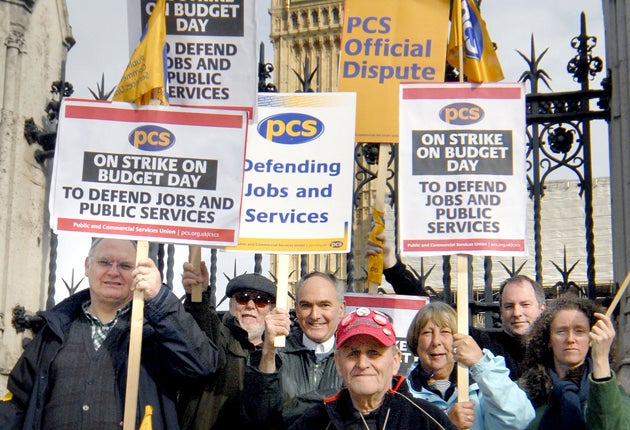£11bn cut in Whitehall costs to help deficit
All Government departments will be affected by economy drive

Plans for cuts of £11bn in the cost of government were set out by Alistair Darling as a key measure for reducing Britain's debt mountain.
All Whitehall departments will be affected by the economy drive. Although ministers insist front-line services will largely be protected from the cuts, the efficiencies are bound to lead to redundancies among civil servants.
Most of the cuts, due to be delivered by 2012-13, will be achieved by slashing back office and IT costs, as well as by buying in bulk and merging quangos.
The Chancellor told MPs: "We can only offer these guarantees for our front-line services – and deliver our plan to reduce the deficit – through continued reform and efficiencies and holding down increases in spending overall."
But senior Conservative sources cast doubt on the Government's ability to achieve the cuts, pointing out that ministers had not even announced overall departmental budgets for future years.
The biggest saving of £4.35bn will be found in health spending. The NHS yesterday committed itself to clawing back £1.5bn by buying goods and services for lower prices. It has set itself a target of saving £555m by reducing staff sickness levels , as well as cutting £60m off its energy bill. Another £70m will be recouped by improving building use.
Andy Burnham, the health secretary, said the "tough efficiency savings" would allow his department to "continue to increase real-terms resources available for patient care year-by-year".
The Department for Children, Schools and Families said it would trim £1.1bn from its budget. More than half, £650m, will be achieved by schools clubbing together to buy goods and services, and a further £50m will be saved through lower energy consumption. The Ministry of Defence promised to save £700m, much of it through efficiencies on construction, food and IT costs.
The Ministry of Justice promised to trim £343m, partly by streamlining the organisations that report to it and moving 1,000 civil service posts out of central London by 2015. The Home Office said its projected saving of £350m would come from improved productivity in the UK Border Agency, reduced use of consultants and cuts in IT spending.
Vince Cable, the Liberal Democrat's Treasury spokesman, said: "These efficiency savings are utterly vacuous. They are also concealing some real cuts. The problem with the Budget was a complete lack of candour, a complete lack of specifics about how the very big cuts we all know are coming, are actually going to be translated into reality."
George Osborne, the shadow chancellor, said: "These announcements are meant to distract attention from the fact that they don't have any spending plans beyond next year."
But Liam Byrne, chief secretary to the Treasury, said: "We think we can merge a lot of the more routine functions in departments to save money – and £11bn is a figure not to be sniffed at, it's a significant amount of change."
The efficiency savings come on top of £5bn of cuts announced last year to lower priority government programmes.
They include such as savings of £1.4bn from scrapping job creation schemes set up as the recession began to bite and £600m from science and research budgets.
Mr Darling also set out plans to trim the budget for public sector pay and pensions by £4.4bn by 2012-13, bringing the total amount the Government can trim state spending to more than £20bn.
Subscribe to Independent Premium to bookmark this article
Want to bookmark your favourite articles and stories to read or reference later? Start your Independent Premium subscription today.

Join our commenting forum
Join thought-provoking conversations, follow other Independent readers and see their replies